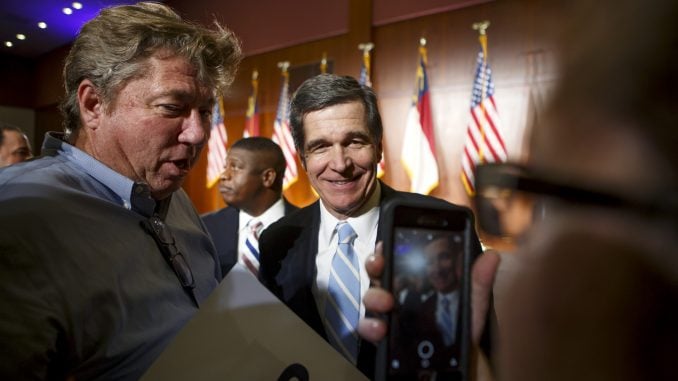
RALEIGH Gov. Roy Cooper is taking heat for appearing to change his position on what he called a “pause” in refugee entries into the United States. During the gubernatorial race, Cooper sided with his opponent then-Gov. Pat McCrory, calling on the federal government to temporarily slow the influx of refugees as more effective vetting processes are implemented. “As chief law enforcement officer of North Carolina, I support asking the federal government to pause refugee entries to make sure we have the most effective screening process possible so our humanitarian efforts are not hijacked,” Cooper was quoted as saying during the campaign in October. “At the same time, we must not let political fear-mongering on this issue divert our attention and resources from stopping terrorists who may already be here or who are trying to get into our country in other ways.”On Sunday, now Cooper issued the following statement in response to President Donald Trump’s executive order instituting a delay on refugee entries from countries with suspected terrorism ties. It put a 120-day hold on allowing refugees into the country, an indefinite ban on refugees from Syria, and a 90-day bar on citizens from Iran, Iraq, Libya, Somalia, Sudan, Syria and Yemen.”The executive order issued by the president will make our homeland and our troops serving overseas less safe. Our vetting process has to be tough and thorough, but we should not impose a religious test to enter the country. It’s especially troubling that individuals who risked their lives to protect our troops and served alongside them are now being turned away. We can secure the safety of our country without separating families, hurting our businesses, and turning away good people who need our help.”The governor’s office did not respond to requests for clarification of Cooper’s position on the issue. However, state Senate leader Phil Berger called Cooper’s comment “double-talk” on his Facebook page. According to a Department of Homeland Security document, 348 visa holders were kept from boarding U.S.-bound flights this week, and 200 people came to the United States but were denied entry as Customs and Border Patrol agents implemented new guidelines for admitting them.The U.S. Immigration Services said Monday that entry for travelers coming from those counties with visas or green cards will be addressed on a case-by-case basis. For refugees, priority will be given to those who are members of a minority religion in their country and are at risk of persecution there. Newly confirmed Secretary of Homeland Security John Kelly will hold a news conference Tuesday afternoon with other department officials to discuss implementation of Trump’s immigration orders.The executive order prompted protests and lawsuits in multiple states. Trump later fired acting U.S. Attorney General Sally Yates, who was a holdover from the Obama Administration, for refusing to enforce the order.The White House said Yates “has betrayed the Department of Justice by refusing to enforce a legal order designed to protect the citizens of the United States” and said her actions were politically motivated.”Ms. Yates is an Obama Administration appointee who is weak on borders and very weak on illegal immigration,” the White House said in a statement. Dana Boente, U.S. Attorney for the Eastern District of Virginia, was sworn in at 9 p.m. Sunday and will be acting U.S. attorney general until Trump’s pick for the post, Alabama Sen. Jeff Sessions, is approved.The White House announced Tuesday that waivers are being granted for 872 people who had already been cleared for resettlement in the United States and were in transit when the order came out. Travelers with dual citizenship are allowed to present a passport from a country other than one of the seven affected countries.A telephone and online survey released from Rasmussen Reports on Monday found that 57 percent of likely U.S. voters favored the temporary ban on refugees from the identified countries. Thirty-three percent are opposed, while 10 percent are undecided.



